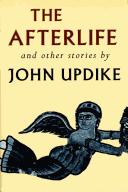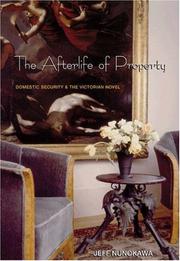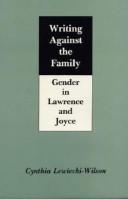| Listing 1 - 3 of 3 |
Sort by
|

ISBN: 0679435832 Year: 1994 Publisher: New York Knopf
Abstract | Keywords | Export | Availability | Bookmark
 Loading...
Loading...Choose an application
- Reference Manager
- EndNote
- RefWorks (Direct export to RefWorks)
Domestic fiction, American. --- Married people --- Middle-aged persons --- Domestic fiction, American --- American domestic fiction --- American fiction

ISBN: 069103320X 0691114676 1282767186 140082463X 9786612767180 1400812844 9781400812844 9781400824632 9780691033204 9780691114675 1400805821 140080583X 9781400805839 9781400805822 9781282767188 Year: 1994 Publisher: Princeton, N.J. : Princeton University Press,
Abstract | Keywords | Export | Availability | Bookmark
 Loading...
Loading...Choose an application
- Reference Manager
- EndNote
- RefWorks (Direct export to RefWorks)
In The Afterlife of Property, Jeff Nunokawa investigates the conviction passed on by the Victorian novel that a woman's love is the only fortune a man can count on to last. Taking for his example four texts, Charles Dickens's Little Dorrit and Dombey and Son, and George Eliot's Daniel Deronda and Silas Marner, Nunokawa studies the diverse ways that the Victorian novel imagines women as property removed from the uncertainties of the marketplace. Along the way, he notices how the categories of economics, gender, sexuality, race, and fiction define one another in the Victorian novel. If the novel figures women as safe property, Nunokawa argues, the novel figures safe property as a woman. And if the novel identifies the angel of the house, the desexualized subject of Victorian fantasies of ideal womanhood, as safe property, it identifies various types of fiction, illicit sexualities, and foreign races with the enemy of such property: the commodity form. Nunokawa shows how these convergences of fiction, sexuality, and race with the commodity form are part of a scapegoat scenario, in which the otherwise ubiquitous instabilities of the marketplace can be contained and expunged, clearing the way for secure possession. The Afterlife of Property addresses literary and cultural theory, gender studies, and gay and lesbian studies.
Domestic fiction, English --- Domestic relations in literature. --- English fiction --- Homosexuality in literature. --- Marriage in literature. --- Property in literature. --- Sex in literature. --- Women in literature. --- History and criticism. --- Woman (Christian theology) in literature --- Women in drama --- Women in poetry

ISBN: 0585219028 9780585219028 0809318814 9780809318810 Year: 1994 Publisher: Carbondale : Southern Illinois University Press,
Abstract | Keywords | Export | Availability | Bookmark
 Loading...
Loading...Choose an application
- Reference Manager
- EndNote
- RefWorks (Direct export to RefWorks)
This first feminist book-length comparison of D.H. Lawrence and James Joyce offers striking new readings of a number of the novelists' most important works, including Lawrence's Man Who Died and Joyce's Finnegans Wake. Cynthia Lewiecki-Wilson argues that a feminist reader must necessarily read with and against theories of psychoanalysis to examine the assumptions about gender embedded within family relations and psychologies of gender found in the two authors' works. She challenges the belief that Lawrence and Joyce are opposites inhabiting contrary modernist camps, arguing instead that they are positioned along a continuum, with both engaged in a reimagination of gender relations. Lewiecki-Wilson demonstrates that both Lawrence and Joyce write against a background of family material using family plots and family settings. While previous discussions of family relations in literature have not questioned assumptions about the family and about sex roles within it, depending instead on an unexamined culture of gender, Lewiecki-Wilson submits the systems of meaning by which gender is construed to a feminist analysis. She reexamines Lawrence and Joyce from the point of view of feminist psychoanalysis, which, she argues, is not a set of beliefs or a single theory but a feminist practice that analyzes how systems of meaning construe gender and produce a psychology of gender. Arguing against a theory of representation based on gender, however, Lewiecki-Wilson concludes that Lawrence's and Joyce's texts, in different ways, test the idea of a female aesthetic. She analyzes Lawrence's portrait of family relations in Sons and Lovers, The Rainbow, and Women in Love and compares Joyce's Portrait of the Artist as a Young Man with Lawrence's autobiographical text. She then shows that Portrait begins a deconstruction of systems of meaning that continues and increases in Joyce's later work, including Ulysses, which, she argues, implicitly deconstructs gender as Joyce launches his attack on the dominant phallic economy. Lewiecki-Wilson concludes by identifying a common interest in Egyptology on the part of Lawrence, Joyce, and Freud and by showing that all three relate family material to Egyptian myth in their writings. She identifies Freud's essay "Leonardo da Vinci and a Memory of Childhood" as an important source for Joyce's Finnegans Wake, which portrays beneath the gendered individual a root androgyny and asserts an unfixed, evolutionary view of family relations.
Feminism and literature --- Domestic fiction, English --- Psychoanalysis and literature. --- Sex role in literature. --- Family in literature. --- Psychoanalysis and literature --- Families in literature. --- Sex role in literature --- Families in literature --- English Literature --- English --- Languages & Literatures --- Family in literature --- Literature and psychoanalysis --- Psychoanalytic literary criticism --- Literature --- English domestic fiction --- English fiction --- History --- History and criticism. --- History and criticism --- Lawrence, D. H. --- Joyce, James, --- Joyce, James Augustine Aloysius --- Joyce, James --- Dzhoĭs, Dzheĭms Avgustin Aloiziĭ --- Džoiss, Džeimss --- Gʻois, Gʻaims --- Joyce, Giacomo --- Jūyis, Jīms --- Tzoys, Tzaiēms --- Tzoys, Tzeēms --- Джойс, Джеймс --- Джойс, Джеймс Августин Алоїсуїс --- Zhoĭs, Zheĭms --- ג׳ויס, ג׳ײמס, --- ג׳ויס, ג׳יימס, --- ジョイス --- ジェームスジョイス, --- Lawrence, David Herbert --- Davison, Lawrence H. --- Lorensŭ --- Lorensŭ, D. H. --- Lourens, D. G. --- Lorenss, D. H. --- Lorens, Deĭvid Gerbert --- Lārensu, Ḍi. Ec. --- Lourens, Dėvid Gerbert --- לאורנס, ד. ה. --- לאורענס --- לורנס, ד״ה --- לורנס, ד.ה., --- לורנס, ד.ה..., --- Political and social views. --- Criticism and interpretation. --- Fiction --- Thematology --- Lawrence, D.H.
| Listing 1 - 3 of 3 |
Sort by
|

 Search
Search Feedback
Feedback About UniCat
About UniCat  Help
Help News
News